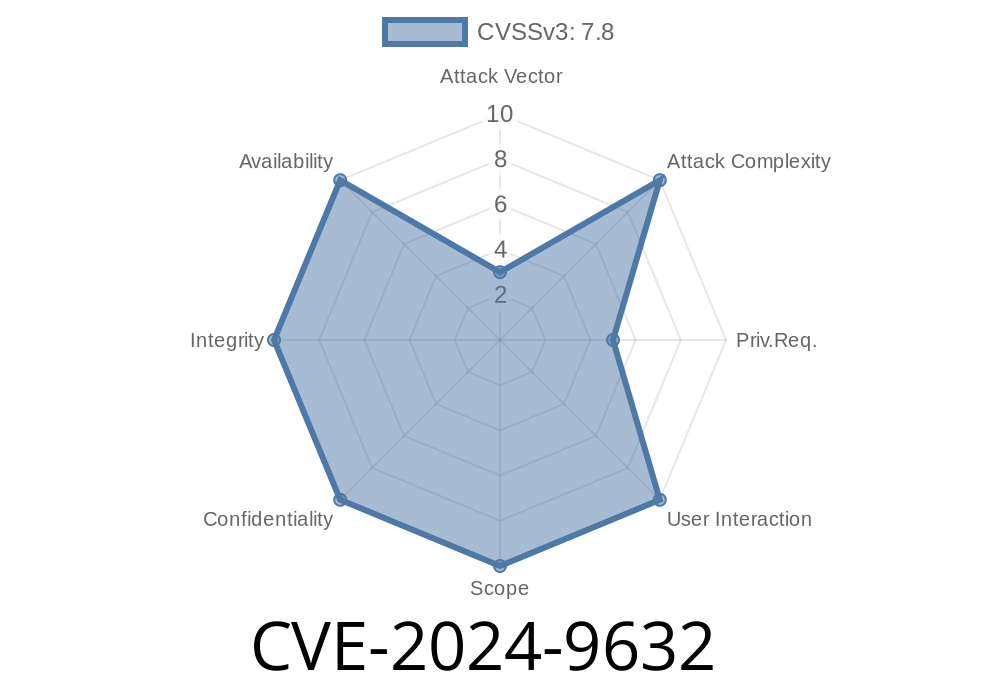April 2024 revealed a nasty bug buried in the mighty X.org Server that most desktop Linux systems use for their graphical screen. Identified as CVE-2024-9632, this flaw can let a local user crash their session at best—or grab root access at worst (if your X server runs with root privileges, as is common on some older or misconfigured systems). Let’s break it down, see the code, and explore how hackers can exploit it.
What Happened with CVE-2024-9632?
The bug sits in the _XkbSetCompatMap() function inside Xorg. This part of the code manages keyboard mappings for the X Keyboard Extension (XKB). XKB lets you have custom layouts and fancy input features, but, unfortunately, in this case, it could let someone run code they shouldn’t.
The main issue: The function didn’t properly keep track of how large a chunk of memory it allocated. That means an attacker could craft a payload that writes more data than expected, pushing bytes past the end of a buffer—a classic buffer overflow. On servers where Xorg runs as root, attacker code could run as root, too!
Here’s a simplified version similar to what's inside xkb/xkb.c
// Vulnerable (C)
int _XkbSetCompatMap(ClientPtr client, XkbDescPtr xkb, xkbCompatMapWireDesc *wire) {
unsigned int size_needed = /* calculate based on 'wire' */;
XkbCompatMapRec *map = malloc(size_needed);
if (!map) return BadAlloc;
// Problem: Underestimates how much 'wire' points to!
memcpy(map, wire, /* insufficient size, e.g. wire->numSI * sizeof(XkbSymInterpretRec) */);
// ... rest of logic ...
}
What’s wrong?
memcpy() copies more bytes than map has, if the wire data doesn't match expectations—but the code never checks what the client actually sent is the right amount for the buffer it allocated!
Here’s how a local user could turn this flaw to their advantage
1. Send a Crafted Payload: The attacker connects to the X server (such as by running a program in their session) and uses XKB config requests to trigger _XkbSetCompatMap() with a maliciously crafted packet.
2. Overflow the Buffer: Because the server doesn’t check the size, bytes overwrite memory beyond map. The overflowing data could stomp on adjacent function pointers, variables, or code.
Privilege Escalation (If X Runs as Root!):
- On some systems, Xorg still starts as root for legacy reasons. Gaining control here means root shell for the attacker.
- Modern distros (with proper configuration) run X as non-root, which limits damage but doesn't eliminate DoS.
Real-world Impact
- If you run X.org as root (prevalent on older Linux, certain BSDs, or misconfigured systems): Full local root exploit.
Try It Out: Minimal Proof-of-Concept (PoC)
Here’s a Python snippet using python-xlib to send potentially malformed XKB data (for demonstration only; won’t work “as is” without a lot of XKB-theory hacking):
from Xlib.display import Display
from Xlib.ext import xkb
d = Display()
# This would be crafted in a real exploit:
malicious_map = b"A" * 1024 # Oversized bogus data
# Trigger an XKB SetCompatMap request (this is a sketch, not real code):
try:
xkb.set_compat_map(d, data=malicious_map)
except Exception as e:
print("Attempted exploit, error:", e)
Fixes & Mitigation
- Patch released: See xorg-server 21.1.12 release notes.
Upgrade your xorg-server to at least 21.1.12.
- Double-check your X server doesn’t run as root (check your service/systemd configs).
Official Advisory Links
- CVE Record at MITRE
- xorg-security advisory
- Red Hat Security Advisory
- Debian Security Tracker
Conclusion
Even old-school software like X.org can still harbor dangerous vulnerabilities. CVE-2024-9632 is a stark reminder that memory safety matters—just a single unchecked length can lead to root compromise. Patch early, run X as non-root, and watch your users!
Timeline
Published on: 10/30/2024 08:15:04 UTC
Last modified on: 12/26/2024 14:22:23 UTC
